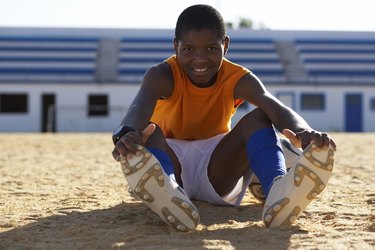
When done properly, weight training offers numerous health benefits to 13-year-old boys. In fact, the American College of Sports Medicine states that a child can safely participate in weight training as long as they are mature enough to follow directions. Although they may not see significant improvements in muscle mass, 13-year-old boys will develop strength and endurance. To prevent injury, boys should focus closely on exercise technique and an adult should supervise their training..
Safety
Video of the Day
Concerns have been raised about teenage boys participating in weight training because of potential damage to still-developing growth cartilage at the ends of their bones. The risk of such injury is very low when teenagers are taught proper training techniques and principles, and when completed appropriately, weight training can decrease the risk of growth cartilage injury. Because of the increase in muscular strength, bone density and coordination that results from weight training, teenage boys will be less likely to hurt themselves while participating in other athletic activities.
Video of the Day
Emphasis
When strength training, 13-year-old boys should focus on mastering exercise techniques. They should perform bodyweight exercises -- such as pushups, pullups, squats, stepups, dips and crunches -- before incorporating weights. After they master these exercises, they can try more complex exercises, such as squats with weights, bench presses, shoulder presses, rows and deadlifts. Free weight exercises are more appropriate than using weight machines, as they will recruit surrounding stabilizing muscles and improve core strength. In addition, most machines are not properly sized for a teenager.
Progression
Begin by training two days per week, with each session consisting of one set of 15 repetitions for each exercise. After you've consistently trained for about three months, increase your training volume to two or three sets of each exercise. During this time, you can increase the intensity of your resistance. The weight you're using should cause you to become fatigued around repetition number 15, but not adversely affect your technique. Increase or decrease the resistance you're using as needed. Do not increase the amount of load by more than 10 percent.
Effects
Teenagers who participate in weight training will see an improvement in muscular strength, muscular endurance, coordination, sports performance, bone strength, bone density and self-confidence. Most of these improvements are based on the neuromuscular system becoming more efficient. Teenage boys will likely not see significant gains in muscle size until they reach puberty, which is marked by an increase in the muscle-building hormone testosterone.